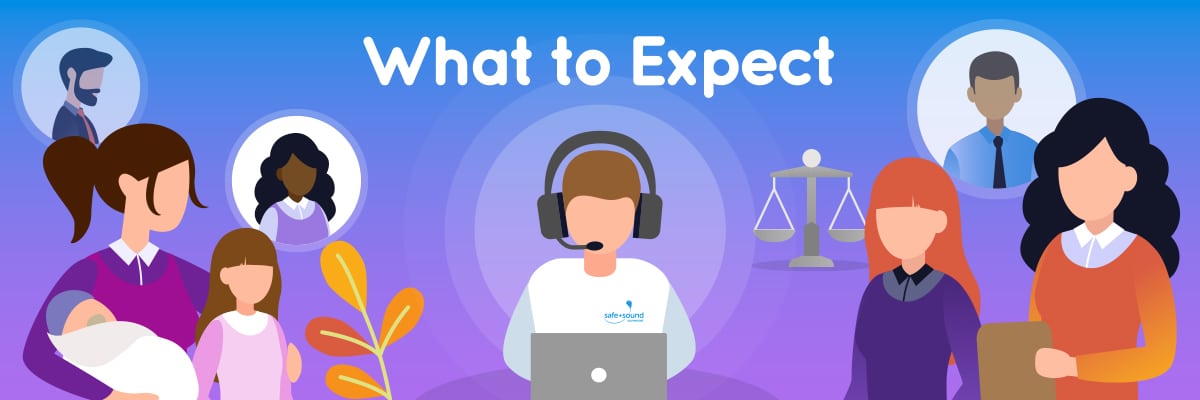A handout explaining what to expect and information about our safe house services.
Safe+Sound Somerset’s advocates, staff and volunteers with extensive training in domestic violence, answer hotline calls and respond to text messages 24 hours a day, seven days a week including weekends and holidays. These skilled and experienced advocates are who a survivor will reach out to if they need emergency shelter because they are experiencing domestic violence. They are voices of hope who are ready, willing and able to provide supportive listening and safety planning, as well as connect survivors to counseling, legal advocacy, housing, financial empowerment and family advocacy services. Those reaching out for help come from all walks of life, socioeconomic backgrounds, education levels, ethnicities and sexual orientation. Our services are free of charge, confidential, and provided in the caller’s preferred language.
When a survivor reaches out to the hotline seeking emergency shelter, our advocates will safety plan with the caller to ensure that the survivor is away from danger and able to freely speak away from the abuser. Next, The advocate starts the pre-screening process which entails gathering information from the survivor in a trauma informed manner. Survivors are also screened for COVID-19 according to CDC Guidelines if the client is accepted into the program.
Once it has been determined that the client will enter the safe house (emergency shelter), the advocate notifies the survivor and assists them with creating a safe exit plan and supporting them in gathering important documents and personal property. The survivor is then instructed to report to a confidential meeting location to prepare to enter the safe house. If our program does not have space, or is not a good fit for the survivor, the advocate works with the survivor to help find another safe place for shelter.
Every emergency shelter is different, but following are the rights and responsibilities that a survivor can expect when entering our safe house:
- A safe and private location. The safety of survivors and staff are our priority. The location of the safe house is confidential, so we require that survivors not disclose the location to anyone, including family or friends during their stay.
- Case Management Services. Upon entry, a survivor is greeted by a case manager who will assist them with completing the intake process. The case manager continues to work with the survivor throughout their stay to identify and help the resident meet goals related to safety, housing, employment, counseling and other important needs that the resident may identify. Residents are also assisted during their stay with basic toiletries, linen, food and other important resources at no cost.
- Transportation. We assist survivors with transportation needs to attend doctor’s appointments, court proceedings related to restraining order, and appointments at the Board of Social Services.
- Children’s Safety. Because children are also impacted by domestic violence, survivors have the opportunity to work with a Family Advocacy team who provides support, information and parenting resources.
- Confidentiality. All information disclosed by the survivor remains confidential and is not shared with other agencies or individuals unless a survivor gives written permission to do so. Residents are required to honor the privacy of other residents and staff by not discussing names or situations with anyone else.
- Private Rooms. Residents are assigned a private room for their family. Each room has beds, a tv, dresser and plenty of closet space for personal belongings.
- Private Areas. Residents are assigned their own living room space, laundry washer and dryer, and dining room table. The kitchen and dining room areas are shared with the other residents in the house.
- Length of Stay. Our emergency shelter program is a 30 day stay with the possibility of two 15-day extensions if the resident needs additional time to stabilize housing. To be considered for an extension, residents must have an active service plan in place including in place.
Our residential case managers and advocates work closely with survivors to help them receive as many services and tools to start a new life free from violence and fear. Survivors have the opportunity to start the healing process by meeting with licensed clinicians for trauma-informed counseling services, and legal advocates to discuss legal options related to restraining orders and other legal needs.
Upon completion of the program, survivors are often are able to secure some form of housing which can include moving into their own apartment, entering a longer-term program such as transitional housing, or moving in with family or friends. We encourage survivors to continue using other services available at our Safe+Sound Somerset such as counseling, financial empowerment and/or legal services for ongoing support after leaving the safe house.
If you or someone you know if experiencing domestic abuse, or you have questions about domestic violence or our services, reach out to Safe+Sound Somerset’s 24/7 call and text hotline at 866.685.1122. Additional information is also available at www.safe-sound.org.










